![]() The question is indeed one of diffusion, as is visible in the transferal from the Pueblos to the Athabascans (Apaches and Navajos) and in the other ones mentioned above. In turn, the Pueblo Indians were instructed by the Mayas and Aztecs; these by the Incas, and the Incas by the Civilizing Heroes that came all the way from Indonesia, across Polynesia and Melanesia, as their own legends and traditions tell in detail.
The question is indeed one of diffusion, as is visible in the transferal from the Pueblos to the Athabascans (Apaches and Navajos) and in the other ones mentioned above. In turn, the Pueblo Indians were instructed by the Mayas and Aztecs; these by the Incas, and the Incas by the Civilizing Heroes that came all the way from Indonesia, across Polynesia and Melanesia, as their own legends and traditions tell in detail.
The Whirling Mountain of the Navajos 2
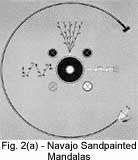
![]() In the figures below we reproduce a few of the lavishly colored sandpainted mandalas of the Navajos, as well as the even more perfect ones of the Hindus and the Tibetans. For reasons of space, we are limited to
In the figures below we reproduce a few of the lavishly colored sandpainted mandalas of the Navajos, as well as the even more perfect ones of the Hindus and the Tibetans. For reasons of space, we are limited to 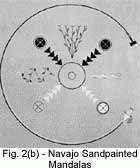 presenting only a couple of such mandalas. But the interested reader is recommended to pursue the comparison in the references listed below, or in any others that he may find for himself in the abundant literature on the subject.2
presenting only a couple of such mandalas. But the interested reader is recommended to pursue the comparison in the references listed below, or in any others that he may find for himself in the abundant literature on the subject.2
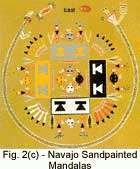
![]() Fig. 2 (a and b) shows the Place of Emergence as the Central Mountain surrounded by the Four Subsidiary Centers (also consisting of mountains or islands). These five mountains are the same as those visited by the Twins, as described further above. The four piled up triangles at the four corners represent the succession of the Four Eras of Humanity, with the fifth being the central one; the Age of the Heroes of Hesiod, the one which corresponds to Atlantis.
Fig. 2 (a and b) shows the Place of Emergence as the Central Mountain surrounded by the Four Subsidiary Centers (also consisting of mountains or islands). These five mountains are the same as those visited by the Twins, as described further above. The four piled up triangles at the four corners represent the succession of the Four Eras of Humanity, with the fifth being the central one; the Age of the Heroes of Hesiod, the one which corresponds to Atlantis.
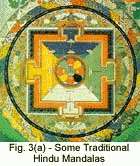
![]() The Hesiodic theme of the Four (or Five) Eras (or Ages) of Humanity again derives from the Hindu Yugas (Eras). But the motif is also widespread all over the Americas, as we show in other works on the subject. The staggered triangles of the Navajo mandala represent the same symbolism as those of the famous Shri Yantra mandala of the Hindus. They represent, as shown in
The Hesiodic theme of the Four (or Five) Eras (or Ages) of Humanity again derives from the Hindu Yugas (Eras). But the motif is also widespread all over the Americas, as we show in other works on the subject. The staggered triangles of the Navajo mandala represent the same symbolism as those of the famous Shri Yantra mandala of the Hindus. They represent, as shown in 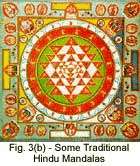 Fig. 3, the sequential Creations of the successive eras emanating like waves from the Primordial Center.
Fig. 3, the sequential Creations of the successive eras emanating like waves from the Primordial Center.
![]() In Navajo sandpaintings, the four subsidiary Holy Mountains placed at the Four Cardinal Directions are often substituted by their Four Guardians. These four are often figured as snakes or birds, their symbolic equivalents. These Guardians are usually colored, and the respective heraldic colors are White, Yellow, Blue and Black, with the fifth, Pink, included at times. The four colors are those of the Sun s House, which is the Central Mountain and combines all four colors in either stripes, dottings or superimpositions.
In Navajo sandpaintings, the four subsidiary Holy Mountains placed at the Four Cardinal Directions are often substituted by their Four Guardians. These four are often figured as snakes or birds, their symbolic equivalents. These Guardians are usually colored, and the respective heraldic colors are White, Yellow, Blue and Black, with the fifth, Pink, included at times. The four colors are those of the Sun s House, which is the Central Mountain and combines all four colors in either stripes, dottings or superimpositions.
![]() The four snaky Guardians are the exact counterparts of what the Hindus call the Four Nagas (“Snake Guardians” or “Dragons”). In India too these guardians are often symbolized by their four mountain peaks, completing the quincunx centered around Mt. Meru. Anyone who pauses to ponder on such exact coincidences cannot, we believe, come to a different conclusion than that they indeed originated in India and Indonesia and, more exactly, in Atlantis and Lemuria.
The four snaky Guardians are the exact counterparts of what the Hindus call the Four Nagas (“Snake Guardians” or “Dragons”). In India too these guardians are often symbolized by their four mountain peaks, completing the quincunx centered around Mt. Meru. Anyone who pauses to ponder on such exact coincidences cannot, we believe, come to a different conclusion than that they indeed originated in India and Indonesia and, more exactly, in Atlantis and Lemuria.